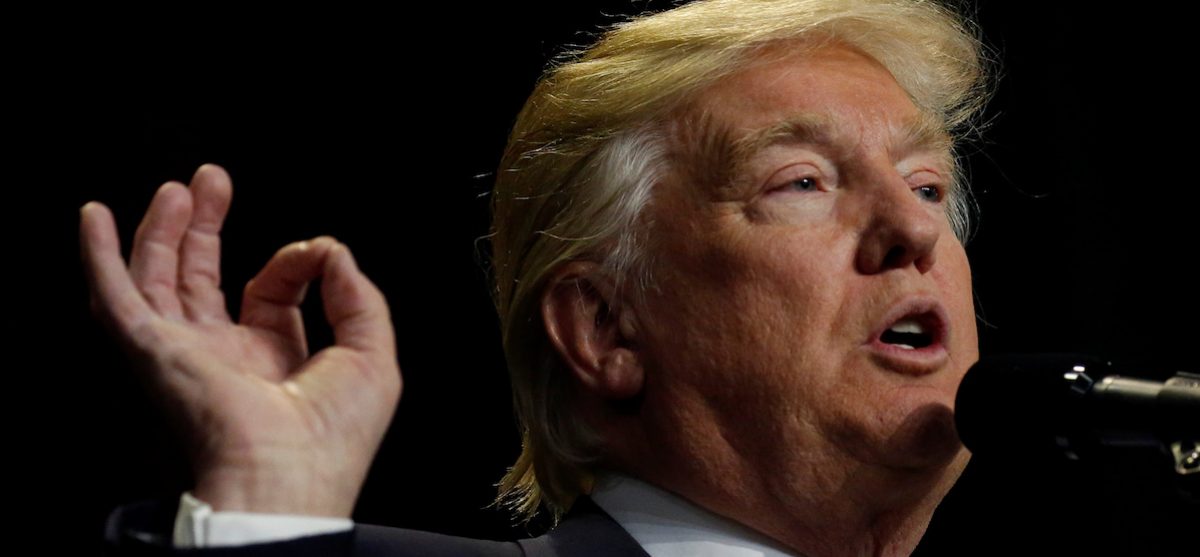By RYAN PICKRELL
 U.S. President Donald Trump speaks at the USA Thank You Tour event at the Wisconsin State Fair Exposition Center in West Allis, Wisconsin, U.S., December 13, 2016.
U.S. President Donald Trump speaks at the USA Thank You Tour event at the Wisconsin State Fair Exposition Center in West Allis, Wisconsin, U.S., December 13, 2016. President Donald Trump expressed a willingness to end the “one-China” policy Friday, threatening Beijing’s bottom line.
“Everything is under negotiation, including one China,” Trump told The Wall Street Journal.
He stressed that unless he sees real progress with regard to China’s currency management practices and bilateral trade, he will not uphold the “one-China” policy.
The “one-China” policy acknowledges that there is only one China represented by the People’s Republic of China, and Taiwan is a part of China’s territory.
The “one-China” policy acknowledges that there is only one China represented by the People’s Republic of China, and Taiwan is a part of China’s territory.
China perceives the “one-China” policy as a “prerequisite for the development of relations between China and the rest of the world.”
Trump has repeatedly threatened the future of this policy.
Trump broke decades of diplomatic protocol at the beginning of December and accepted a phone call from the president of Taiwan Tsai Ing-wen.
Trump has repeatedly threatened the future of this policy.
Trump broke decades of diplomatic protocol at the beginning of December and accepted a phone call from the president of Taiwan Tsai Ing-wen.
Until Trump, no president had made contact with a Taiwanese president since the U.S. officially broke ties with the self-ruled island in 1979.
China called the phone conversation a “petty trick” and criticized Trump for his “inexperience.”
Trump fired back on Twitter. “Did China ask us if it was OK to devalue their currency (making it hard for our companies to compete), heavily tax our products going into their country (the U.S. doesn’t tax them) or to build a massive military complex in the middle of the South China Sea? I don’t think so!” he tweeted.
He doubled down on his comments one week later.
“I don’t want China dictating to me,” Trump said in an interview with Fox News.
China called the phone conversation a “petty trick” and criticized Trump for his “inexperience.”
Trump fired back on Twitter. “Did China ask us if it was OK to devalue their currency (making it hard for our companies to compete), heavily tax our products going into their country (the U.S. doesn’t tax them) or to build a massive military complex in the middle of the South China Sea? I don’t think so!” he tweeted.
He doubled down on his comments one week later.
“I don’t want China dictating to me,” Trump said in an interview with Fox News.
“Why should some other nation be able to say I can’t take a call?”
“We’re being hurt very badly by China with devaluation, with taxing us heavy at the borders when we don’t tax them, with building a massive fortress in the middle of the South China Sea, which they shouldn’t be doing, and frankly with not helping us at all with North Korea,” he added.
“I fully understand the ‘one China’ policy, but I don’t know why we have to be bound by a ‘one China’ policy unless we make a deal with China having to do with other things, including trade,” Trump explained.
Trump has targeted Chinese "core" interests and sensitive issues, threatening to label China a currency manipulator, heavily tax Chinese exports, push the country in the South China Sea, and end the “one-China” policy.
“We’re being hurt very badly by China with devaluation, with taxing us heavy at the borders when we don’t tax them, with building a massive fortress in the middle of the South China Sea, which they shouldn’t be doing, and frankly with not helping us at all with North Korea,” he added.
“I fully understand the ‘one China’ policy, but I don’t know why we have to be bound by a ‘one China’ policy unless we make a deal with China having to do with other things, including trade,” Trump explained.
Trump has targeted Chinese "core" interests and sensitive issues, threatening to label China a currency manipulator, heavily tax Chinese exports, push the country in the South China Sea, and end the “one-China” policy.
The year ahead will be marked by a significant deterioration in U.S.-China relations.
Aucun commentaire:
Enregistrer un commentaire